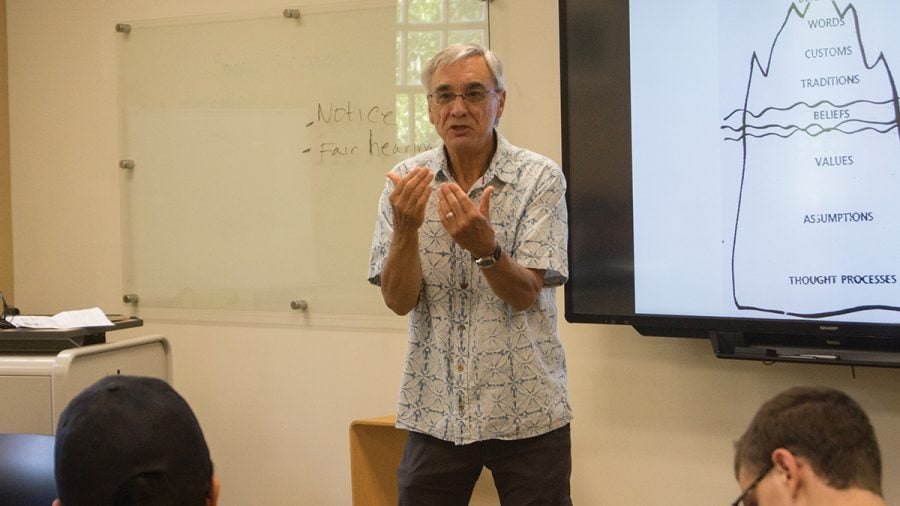Peace and Conflict professors talk impact of culture
Take a second to think about how culture affects our everyday interactions, beliefs and behavior. We are each a part of an innumerable amount of cultures that make up who we are. Oftentimes, we are not even aware of it.
On Thursday, Sept. 22, in his talk “Understanding Culture in Multicultural Conflict,” Dr. Vernie Davis, one of the founders of Guilford’s Department of Peace and Conflict Studies, explored just this: culture. Davis’ main goal was to deepen the listeners’ understanding of culture, while demonstrating how it impacts individual perceptions and behavior.
“There are plenty of conflicts that take place in multicultural settings where culture is not the cause,” said Davis, “but culture almost always plays a part in some way.”
Before Davis went on to discuss the complexities and implications associated with culture, he defined what culture meant to him and how he would be referring to it throughout his lecture.
“I see culture essentially as knowledge or socially acquired knowledge, because we get it by interacting with others, not by sitting in a library alone,” Davis said. “We use it to interpret the world and generate our behavior.”
Using this definition as a starting point for his talk, Davis built on the idea that culture is what makes us who we are, even if we are unaware of it.
“I want to make this point that a lot of it is tacit,” Davis said. “It’s outside of our conscious awareness. The thing the fish is least aware of is the water in which it swims.”
Throughout his lecture, Davis shared a variety of anecdotes to describe the subtle differences in culture. One such story was about a guest speaker, Francis Hsu, who grew up in China.
In the 1980s, Hsu visited Guilford to discuss how he believed American social science theories were reductionist, only looking for a single answer, while his own theories looked at social relationships.
During his talk, Hsu worked his way around the topic with metaphor, instead of resorting to a more linear fashion. Davis described this as a way of thinking and as a tool used for discussion, rooted in many Asian cultures.
“Understanding Culture in Multicultural Conflict” brought a variety of individuals together for discussion, each with a shared connection to Guilford, but with stories of their own.
The event was organized by Professor of Peace and Conflict Studies Zulfiya Tursunova.
“Understanding the role of culture in multicultural conflict is critical in communication, dialogue, negotiation and building a culture of peace on campus and in communities we live,” said Tursunova.
“… Dispute resolution applied by different cultures is important in the mutual exchange of ideas and development of meaningful relationship instead of fragmentation, discrimination and oppression.”
Another attendee, Ava Dempsey, was visiting Guilford from Decatur, Georgia, as a prospective student.
“When I decided to come to Guilford, I was able to sit in on a class, and I thought peace and conflict studies sounded interesting,” said Dempsey. “I think it was interesting that they talked about the coups that we had in Iran. I had no idea about that.”
Likewise, many of the students from the peace and conflicts class found Davis’ talk to be directly related to what they were studying.
“Though I’d already read about and understood many of the aspects of culture that Vernie Davis discussed, I absolutely began to understand more about culture after his talk,” said Early College Student Elena Carabeau. “The way he put the more abstract points of culture in conflict into concrete examples helped develop my understanding of the subject, and I definitely learned a lot from listening to him.”
As the talk came to a close, Carabeau reflected on the messages Davis’ talk brought forth.
“I think the topic of this event is relevant to everything in the world,” Carabeau said. “It was very interesting how culture can affect any type of interaction, and I think everyone should be aware of that.”









